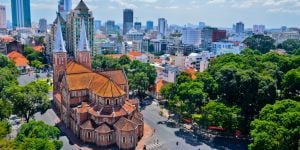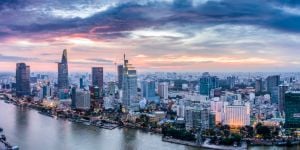Expats travel to Vietnam may have difficulties with many arising problems about Visa, Currency exchange, Healthcare service, Language barrier… Do not worry about that! I will give you some tips so that you can easily deal with them and have a good vacation in my country.
Hoi-An-Countryside-700x700
1. Visa extension: Your visa is out of date though you did not keep it in mind and already had a plan to visit somewhere you was interested in. For example,you bought a bus or plan tickets to Ho Chi Minh city on 12th of July and planned to stay there a week but your visa expiry is 14th of July. It is a true problem if you do not know how can you extend your visa and how much it cost for visa extension. Here are some tips to help you easily face with this issue.
Generally, it is relatively easy to extend the visa for your longer stay in Vietnam at present through a travel agency. Renewal for the first time may cost you about 25-30$ (including a handling fee) and takes 03 working days to process (Monday to Friday).
The maximum period you can ask for is 30 days and it costs the same whether you ask for 1 day or 30 days. A second 10-day extension is possible at a cost of around $35-40.
For this second extension you will be asked to show an air ticket dated after the expiry of your visa.
Searh for this website to have more usuful information. vietnamvisa.info/
2.Currency exchange: Vietnamese people mainly use Vietnamese Dong, the offical currency for exchanging goods,. One dollar equals 21,740 Vietnam Dong. There are lots of zeros printed on the currency and to make it convenient for the It makes it easier figuring out pricing in your head and eliminates some punches on our calculators.If you intend to change your home currency to Vietnam dong,ensure that your notes are clean and undamaged as banks or other exchanges will not accept any notes which is torn or have writing on. Do not try to change too much money one time because at the end, you will end up with a wad of notes.Visa or master cards are becoming more accepted in many resorts,big hotels, shopping malls and restaurants.
There are a numbers of international banks working 24/24 hours with cash withdrawal facilities in Ha Noi, Ho Chi Minh city, Da Nang….
3. Healthcare service: is one of the biggest problems, expats have to deal with when your health get bad or unluckily you get a disease or a traffic accident in Vietnam. The healthcare system in Vietnam combines aspects of Eastern and Western medicine. The Vietnamese government is currently working to develop a universal healthcare plan, which will cover all residents with basic medical care.
The quality and availability of healthcare is especially poor in rural areas, and in some of the most remote parts of the country healthcare is non-existent.
You need to take out your private health insurance before travelling to Vietnam. This will cover your treatment at private healthcare establishments.
Doctors and medical staff working at public hospitals in Vietnam will generally only speak Vietnamese.
Pharmacies in Vietnam are well stocked and easy to find, especially in big cities such as Hanoi and Ho Chi Minh City. Pharmacies can be found on any major shopping street or mall.
You should, however, be aware that many of the drugs sold in Vietnamese pharmacies are likely to be counterfeit or have expired; therefore, always make sure to check the date on the packaging before making a purchase. In addition, expats who want to be extra careful can either take the necessary medicines from their home country, or visit a pharmacy in one of the private hospitals or clinics.
You should not experience too much difficulty in bringing prescription medicine into Vietnam. It is best to carry a copy of the prescription and a letter from the doctor confirming that the medication is for personal use.
There are no special immunizations required for those travelling or moving to Vietnam. However, expats moving to Vietnam should ensure that their vaccinations for the following diseases are up to date:
Hepatitis A
Hepatitis B
Tetanus
Diphtheria
Rabies (optional, but advisable for those travelling or working in rural areas)
4.Language barriers can be a real challenge as Vietnamese is very hard to learn .Simple tasks can take an incredibly long time to get done because of the misunderstanding about the meaning of the word. Furthermore, Vietnamese is so utterly dependent on accurate tone so it is difficult for your understanding one word. In Vietnam, Vietnamese people commonly speak Vietnamese daily in most of their fields. A part of Vietnamese people speak English as a second language.
In order to make your idea to be understanding You should try to speak slowly and clearly as possible. Avoid speaking idioms and slang.
5.Bargaining is an art for buying in Vietnam, it is always worthwhile. Bargaining is part of Vietnamese culture as through bargaining people communicate with others, create and build up their relationship, not to mention a form of entertainment. Except for some places that they offer products labeled with fixed prices, feel free to bargain almost anytime and anywhere.
To get better deal in Vietnam, you are supposed to take into consideration some bargaining tips as follows:
As foreigners, it is not easy for you to use your words to persuade them to reduce their price as most of the locals do not speaking English well; therefore, your only remaining arm is your smile and your friendliness.
Walking away is a bargaining tool that you should not forget to use. If they call you back, do not let your pride get in the way of coming back
You are supposed to bargain in Vietnamese currency (VND) rather than in USD or your currency as in Vietnam, it is widely believed that who has dollars can afford to spend them.
When you are bargaining, it is nothing wrong to tell lies as these lies do no harm at all. You could win salesmen’s heart and have their compassion by your lies, surly resulting in a better deal for you.
 Student life in Ho Chi Minh City
Student life in Ho Chi Minh City Choosing your neighbourhood in Ho Chi Minh City
Choosing your neighbourhood in Ho Chi Minh City Accommodation in Ho Chi Minh City
Accommodation in Ho Chi Minh City Getting around Ho Chi Minh City
Getting around Ho Chi Minh City Leisure activities in Ho Chi Minh City
Leisure activities in Ho Chi Minh City Buying property in Ho Chi Minh City
Buying property in Ho Chi Minh City Where to Live in Saigon or Ho Chi Minh City
Where to Live in Saigon or Ho Chi Minh City Shopping in Saigon
Shopping in Saigon




